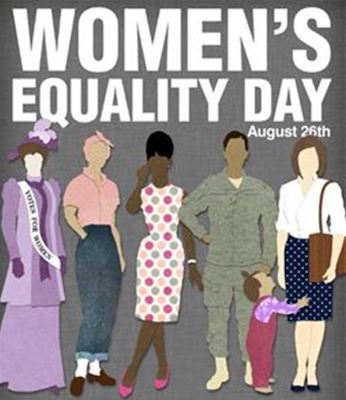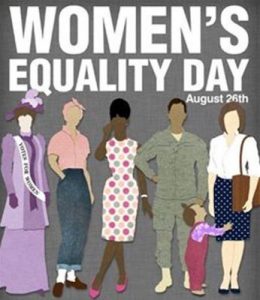
 August 26 is Women’s Equality Day. This date commemorates the passage of the Nineteenth Amendment, which prohibits denying someone the right to vote on the basis of sex. As we mark the 100-year celebration of this amendment, we are still reminded of how important voting rights are. This year we have seen exacerbated gaps in our healthcare, housing, and educational systems, with those already on the margins being disproportionately affected by pandemic related issues. Because these are all systemic issues, they require policy changes and wide-scale reform. Voters begin this reform process when they decide for whom they will cast their ballot.
August 26 is Women’s Equality Day. This date commemorates the passage of the Nineteenth Amendment, which prohibits denying someone the right to vote on the basis of sex. As we mark the 100-year celebration of this amendment, we are still reminded of how important voting rights are. This year we have seen exacerbated gaps in our healthcare, housing, and educational systems, with those already on the margins being disproportionately affected by pandemic related issues. Because these are all systemic issues, they require policy changes and wide-scale reform. Voters begin this reform process when they decide for whom they will cast their ballot.
Unfortunately, echoes of voter suppression continue to ring throughout our country. According to the ACLU, we saw record turnout among minority voters in 2008. What followed this was 16 states passing voter suppression laws by 2011. These include things like requiring voter ID, shortening early voting periods, or limiting voter registration drives. These laws are more likely to impact African American and Hispanic voters. Additionally, we know implicit bias and discrimination make voting an uncomfortable or intimidating exercise for racial minorities, immigrants, or low-income voters. We cannot embrace our diversity if we silence these voices. We cannot work towards equity and justice if we suppress the fundamental right to vote.
This year, AMAZEworks has had the opportunity to partner with Ramsey County election officials in Minnesota to create training videos for election judges that highlight potential instances of bias and prejudice and support taking action to address them. Because we bring our identities into every setting, it is important for election judges to recognize and understand that in small but important exchanges during the voting process, implicit bias can trigger negative feelings that disenfranchise voters and possibly keep them from voting in the future.
By increasing our awareness of barriers to voting, including the role of identity, difference, and bias in creating conditions of exclusion and disenfranchisement for some voters, we move closer to fairer elections. When we create space for all voices to be heard, we arrive at more equitable laws and policies. This is the same goal that women suffragists were fighting for a century ago. AMAZEworks stands with those who continue the fight.